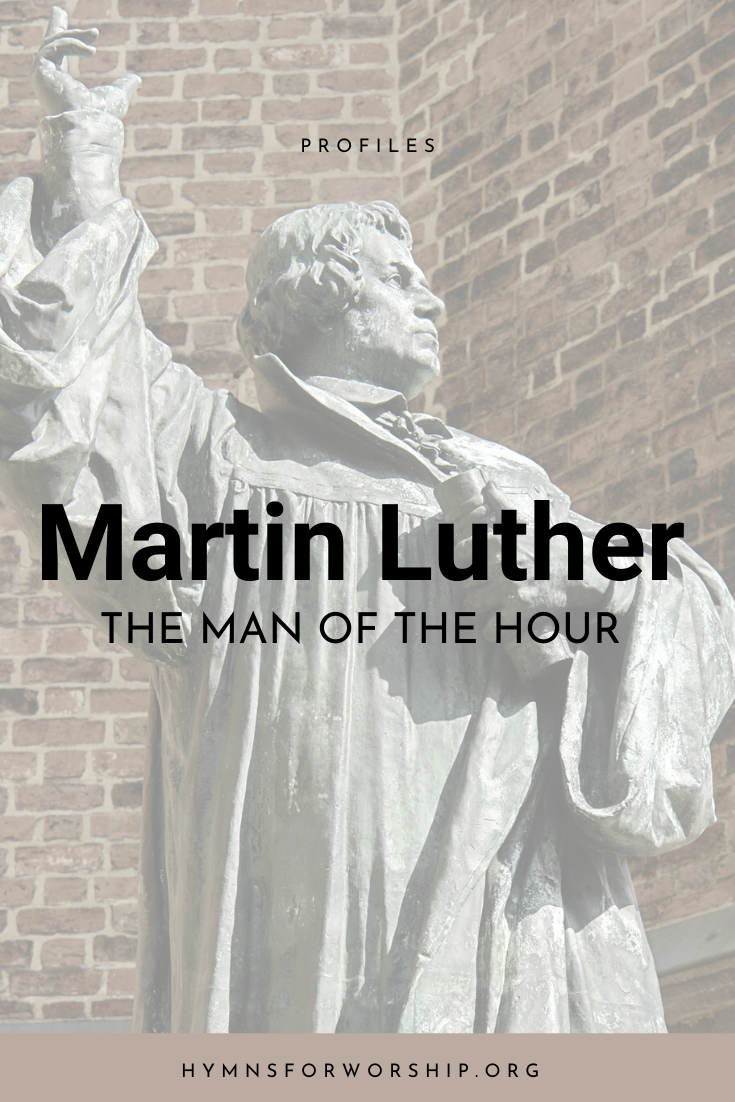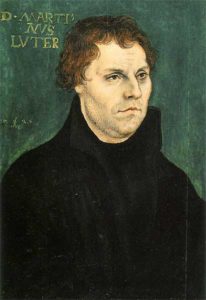Foremost among those who were called to lead the church from the darkness of popery into the light of a purer faith, stood Martin Luther. Zealous, ardent, and devoted, knowing no fear but the fear of God, and acknowledging no foundation for religious faith but the Holy Scriptures, Luther was the man for the time; through him God accomplished a great work for the reformation of the church and the enlightenment of the world. Great Controversy, 120.
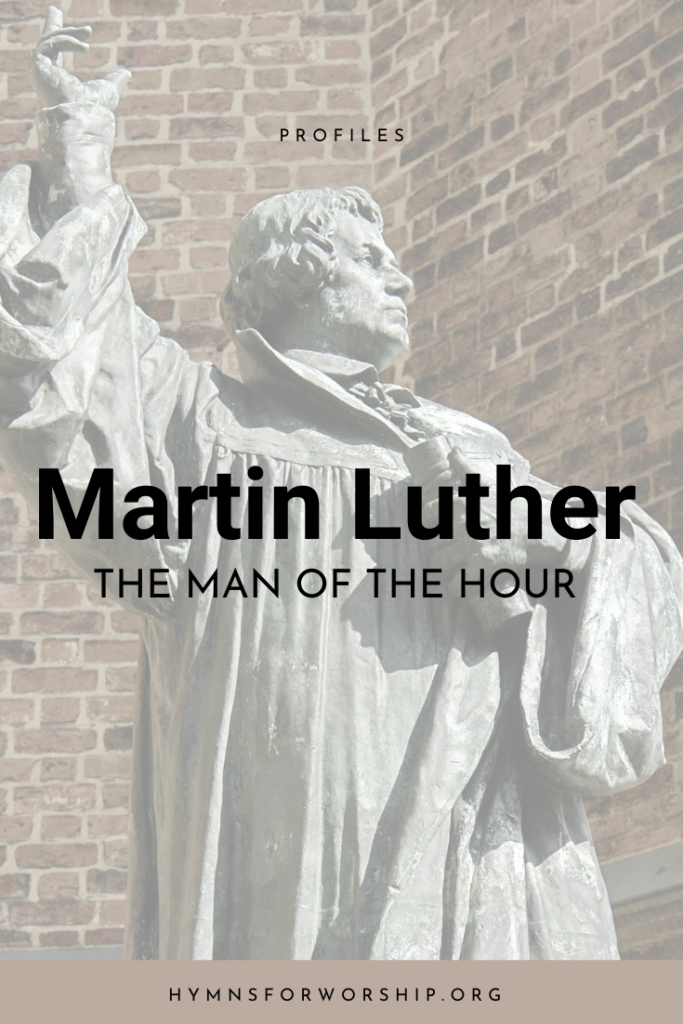
First Things First
Young Martin Luther.
Source: www.reformationbiblecollege.org
Luther was born at Eisleben, a town in Saxony-Anhalt, Germany.
He was raised in Mansfeld, where his father, Hans Luther, daily toiled at the local copper mines. His father’s efforts were fueled with humble hopes that his son would one day be instrumental in advancing God’s truth.
Luther got an early head start with formal education. However, he was treated with harshness and even violence in school.
At 18 years old, he went to the University of Erfurt to study law. There Luther earned both his baccalaureate and master’s degree in the shortest time allowed by university statutes. His retentive memory, lively imagination, strong reasoning powers, and untiring zeal placed him in a formidable status among his colleagues. He proved so proficient at public debates that he even earned the nickname “The Philosopher.”
Then his life took a dramatic turn. The 21-year-old Luther was fighting his way through a severe thunderstorm on the road to Erfurt when a bolt of lightning struck the ground near him.
“Help me, St. Anne!” Luther screamed. “I will become a monk.”
Against his father’s wishes, Luther fulfilled his end of the bargain: he gave away all his possessions and entered the monastic life.
A Monk’s Life
Luther tediously lived the monk’s life. He rigorous with his prayers, fasting, and other self-abnegating practices. For days on end, he would go without sleep or food and endure bone-chilling cold without a blanket. He would also beat himself up, in every literal sense of the word.
In this manner, he was truly sincere in showing his love for God. But he found no consolation. His nights were spent trembling and agonizing at the thought of God as a stern, unrelenting judge and a cruel tyrant.
Of these practices he later commented,
“I was indeed a pious monk, and followed the rules of my order more strictly than I can express. If ever monk could obtain heaven by his monkish works, I should certainly have been entitled to it…If it had continued much longer, I should have carried by mortifications even to death.”
A Spiritual Breakthrough
During his early years, whenever Luther read Romans 1:17 his eyes were drawn not to the word faith, but to the word righteous. His simple understanding was, who could “live by faith” but those who were already righteous? Because as the text says: “the righteous shall live by faith.” The study of these words tormented him even more. He could not live by faith because he knew he was not righteous.
Finally, his friend Staupitz expounded God’s word to him and advised him to stop punishing himself. His wise words were,
“Instead of torturing yourself on account of your sins, throw yourself into the Redeemer’s arms. Trust in Him, in the righteousness of His life, in the atonement of His death…Listen to the Son of God. He became man to give you the assurance of divine favour…Love Him who first loved you.”
These words made a deep impression on him. Meanwhile, he was ordained as a priest and was called to take his doctorate in the Bible and become a professor at Wittenberg University.
During those years of lecturing on the Psalms and a study of the Book of Romans, he began to see a way through his dilemma.
“At last meditating day and night, by the mercy of God, I … began to understand that the righteousness of God is that through which the righteous live by a gift of God, namely by faith… Here I felt as if I were entirely born again and had entered paradise itself through the gates that had been flung open.”
This understanding brought on more light. Luther began to see that salvation does not come by works or deeds but by faith. He scoffed at the idea that human beings have an inkling of righteousness on their own. To humble one’s self was no longer a virtue just to earn grace but a vital response to the God’s gift of grace. Faith no longer consisted of complying with the church’s teachings but of trusting the promises of God and the merits of Christ.
What a revelation!
It wasn’t long before this dramatic change in Luther’s heart and mind played itself out in all of Europe.
“Here I Stand”
It started out when Luther publicly objected to the way indulgences were sold. Johann Tetzel, known as the Grand commissioner of indulgences in Germany, advertised: “Once the coin into the coffer clings, a soul from purgatory heavenward springs!”
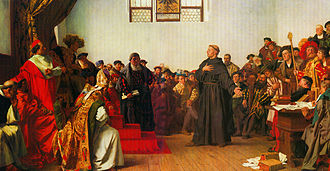
Luther at the Diet of Worms, by Anton von Werner, 1877.
Wikipedia
This method of church trafficking raised up questions in Luther’s heart. He waited for the perfect time to publicly and effectually voice out his protest, and the occasion soon presented itself.
A day preceding the festival of All Saints Day, a day when masses and crowds of people were making their way to the castle church of Wittenberg, a strange paper was discovered nailed to the door of the massive structure. The famous 95 Theses.
Here, Luther revealed the scam that the church was pulling through indulgences. As you can imagine, the commotion was not limited to those who were there at Wittenberg’s church. It caused quite a stir in the university, in the city, in the whole nation, and even around the world.
Events rapidly gained momentum.
The year was 1521. We now see the fearless reformer called to an assembly at Worms, Germany, to appear before Charles V, Holy Roman Emperor. Although not his first debate, the agenda remained the same. To have him recant his views or be totally excommunicated.
Luther, expounding on the truths of God with distinct clarity and confidence, was not fazed. This enraged the Diet. One final chance was given to him to retract.
To this, Luther replied,
“Unless therefore I am convinced by the testimony of Scripture or by the clearest reasoning, unless I am persuaded by means of the passages I have quoted, and unless they thus render my conscience bound by the word of God, I cannot and will not retract, for it is unsafe for a Christian to speak against his conscience. Here I stand, I can do no other; may God help me. Amen.”
By the time an imperial edict calling Luther “a convicted heretic” was issued, he had escaped to Wartburg Castle, where he hid for ten months.
Active Obscurity
Many history books write that he spent his later years away from the limelight. Yet while it is true he spent a considerable amount of time away from the heat of the “battle,” he busied himself by writing. Tracts, sermons and other articles flowed from his ever-active pen.
And while his enemies thought he was silenced forever, time and time again they will get a hold of tangible proofs that he was still alive.
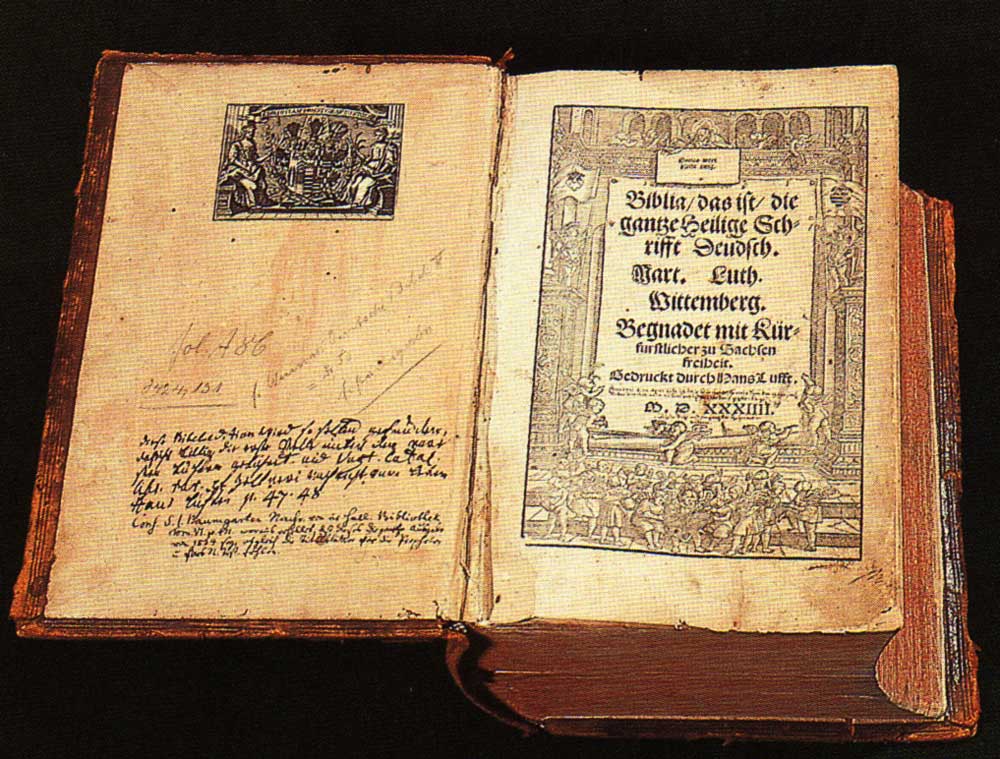
Luther Bible, 1534.Wikipedia
Some of his lasting legacies was the translation of the Bible into German, the writing of the hymn “A Mighty Fortress is Our God,” and publishing other books that guided not just the Lutherans but many others.
Luther’s influence on every Protestant Reformer cannot be adequately summarized. Truly, his reform unleashed forces that ended the Middle Ages and ushered in the modern era.
But lest we be in danger of extolling Luther and his works, let us turn our eyes to God who is the real cause for the Reformation.
More Reading:
Luther’s Separation from Rome
Luther Before the Diet
Like this article? Share it!

